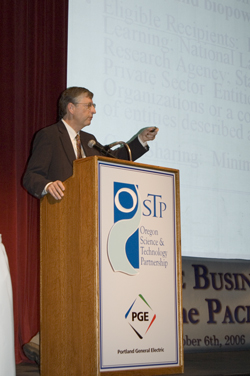Biofuel Conference gives community insight on emerging industry
The Oregon Science & Technology Partnership (OSTP) BioFuels Conference at Mt. Hood Community College on Friday highlighted the Pacific Northwest’s growing biofuels industry, as local businessmen and energy officials representing biofuels interests converged in the College Theater. MHCC President Bob Silverman opened the conference and was followed by a spokesman for senator Gordon Smith R-Ore. Video cameos from representative Blumenauer D-Ore., third congressional district, and Congressman Greg Walden R-Ore., highlighted the work they have done for pushing biofuels interests for Pacific Northwest industry. Other companies in attendance Friday were PGE, TriMet, the Oregon Environmental Council, the U.S. Department of Agriculture, the Oregon Department of Energy and the Northwest Bio Fuels Association. The conference was the first for MHCC, which President Silverman has made into a community energy initiative, aimed at getting local community support for the emerging biofuels industry in the Northwest. MHCC’s own Environmental Health and Safety (EHS) Department was on hand promoting itself. Javid Mohtasham, who heads the EHS, has ambitiously been developing a biofuels course for winter quarter, in which students will be able to learn how to produce biodiesel, and learn about the surrounding environmental health and safety issues concerning the industry. EHS representative Nathan Light was rubbing shoulders with local business leaders on Friday in what he described as “promoting our department, we’re promoting biodiesel and we’re promoting our new class.” The class which Light was referring to is next winter’s EHS dept. biodiesel class, which Light says aims to “bring people off the street, from local businesses needing to train people, to others from the community, from the high schools, local farmers, students, whoever wants to get involved in learning about creating biodiesel.” The two-credit course will cover work place health and safety, Occupational Health and Safety (OSHA) regulations and Environmental Protection Agency (EPA) standards for companies producing biodiesel. The EHS department is hoping to get the sciences involved in the development and making of biodiesel, providing the community with the necessary skills needed for filling positions in the emerging biofuels industry in the northwest. As David Garlington instructor of business pointed out, “The more we can understand the emerging industries where the students are going to be working after they finish their educations, they [the students] get more focused and therefore able to go and get the skill sets they need for the jobs they are going to be fulfilling. And if 30% percent of fuel is going to come from biodiesel in the next 20 years, then I think students need to be aware of the job possibilities and start getting the technologies and soft skills so that they can fill those positions.” The jobs Garlington referred to may have been shaping up inside the conference as speakers from the U.S. Department of Agriculture and other industry leaders spoke of the new developments and rewards that are being offered by the U.S. government to those companies wishing to enter the biofuels industry. There are 67 biofuels plants operating in the United States, with roughly 60 billion gallons of biofuels being produced mainly in the “corn belt”- those states located in the Midwest that primarily rely on corn for agriculture. But current oil woes caused by skyrocketing costs, and turbulence in the Middle East have created a window for biofuels to spread out around the country. In the Pacific Northwest, business leaders are trying to take advantage of Oregon’s emerging biofuels market, which the Oregon Business Association and the Oregon Environmental Council say will significantly boost local and state economies. Biofuels are renewable fuel sources produced from any biomass, the two most common sources being ethanol, made primarily from corn, and biodiesel, which is mainly produced from oil seed crops, used cooking oils or unwanted animal fats. Biofuels can also be derived from any crop biomass such as grasses, like those commonly grown in eastern Oregon and chipped bio-mass commonly discarded and burned by logging operations in the central and coastal regions. Aside from their purported economic advantages by industry gurus, biofuels also provide cleaner renewable energy sources that combat global warming from the tailpipe to the smoke stack. “The conference lets the community know that we’re looking into the emerging industries that we’re going be continuously trying to find,” said Garlington. “We here [at MHCC] are trying to get things going as opposed to sitting and waiting for something to happen. We’re trying to instead encourage things to actually happen in the community.” So far Oregonians have seen some positive benefits of the emerging biofuels industry here in Oregon. According to the U.S. dept. of Agriculture, $3.8 million in grants is being issued to Oregonians for rural economic development for the creation of biofuels plants and industry growth. USDA spokespersons attended the event and spoke before the conference highlighting some of the benefits already being generated by some emerging local industries before those on hand for rural communities of 50,000 persons or less. As a PGE spokesman said, “Really it comes down to choosing where you want your energy to come from. A large amount of our power comes from the Midwestern coal power, federally owned hydropower and natural gas. But you can choose renewable electricity created right here in Oregon, like wind. Keep your money right here in Oregon, help support local businesses and become carbon neutral all at the same time.” PGE and TrMet have also helped spark interest since they both significantly use biofuels. “A lot of people through the Science Club have been writing reports on biofuels and have used us as a source, and through that we’ve also been able to raise student interests in the biodiesel course.” Anyone interested in the biodiesel program is encouraged to contact Light or Mohtasham in the EHS department.
|

